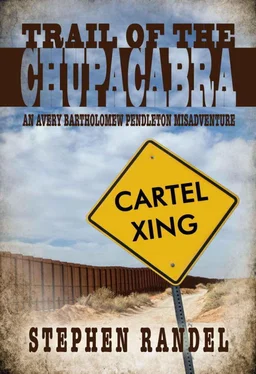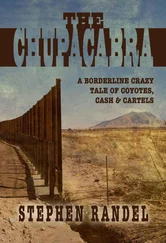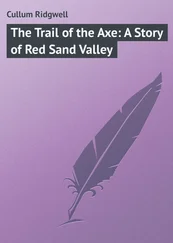“My apologies, Private, he meant blood. The chupacabra’s major motivation is blood. It prefers human, but it can survive on goat’s blood if necessary. They’re extremely smart and experts at the art of camouflage, but when they get even the slightest whiff of fresh blood, they tend to lose their minds. Their eyes glow in the dark, and they become single-minded in purpose. If confronted by one, don’t ever turn your back to it. They can leap twenty feet in the air and can outrun a well-motivated springbok.”
“How many are there?” asked Fire Team Leader Bravo.
“My calculations suggest that for a healthy breeding population to survive, there would need to be at least several hundred of them.”
“Why aren’t there any bodies of the ones that die?”
“Well, Team Leader, my hypothesis is that they are cannibals when it comes to their deceased pack members.”
“That would explain it,” Private Zulu said. “Are we going to need some kind of hunting license in case we run into a game warden?”
“Excellent question, Private. Genetically speaking, the chupacabra falls outside of the spectrum of wolves, dogs, and coyotes. As such, the Mexican law is silent on the issue. So consider there to be no limit on the bloodsuckers. Bag as many as possible.”
“If we have any extra, can we barbeque them? Fire Team Leader Charlie makes a damn fine sauce.”
“Absolutely not. These creatures are scientific treasures. You wouldn’t pan-fry a coelacanth, would you?”
“Depends on whether or not I had any cornmeal handy.”
“Personally,” Private Foxtrot added, “I like cracker crumbs myself. Oh, wait a minute…let’s stop talking about food.” The private grabbed at his gurgling stomach.
“Knock it off, men,” the General said. “We’re on an official mission here. We will act according to the rules of the Geneva Convention, which is very clear on the prohibition of cooking prisoners. Even in beer batter, which, for the record, is the best way.”
“Thank you, General. I appreciate your support in this matter. Now, if I’m right, and I usually am, we are in a perfect location to detect a suitable specimen.”
“How come?” asked Private Tango.
“Elementary. Plenty of dry cover and a local source of water.” Avery pointed to a small stream a few hundred yards away. “Over that rise about a mile away is a large farm.” He pointed in the other direction. “They more than likely have a varied collection of livestock that may attract the chupacabra. Plus, I’m almost positive I spotted a group of three traveling through this area last week when using my ultra-sensitive high-altitude satellite monitoring system.”
“What?” General X-Ray asked.
“Like, Google Earth, dude,” said Ziggy, returning with a struggling iguana under his arm.
“I need to get one of those,” the General said enviously.
“We’ll set up a honey pot on the other side of that rise and watch for activity. In the meantime, we’ll start looking for signs of recent activity. Namely, footprints and scat.”
“What?” asked Private Tango.
“Poo. Look for evil-smelling poo.”
CHAPTER THIRTEEN
Hard Bargain
In the desert, a black limousine drove along a rutted dirt road. Inside the vehicle, Colonel Cesar Beltrán sat in the back with two armed guards. Up front, another gunman accompanied the driver. The car began to slow as it approached a white fence surrounding a large compound. To the left, a yellow farmhouse sat across from a massive red barn. The back of the compound contained a series of low black buildings that appeared to be some kind of barracks. A sentry at the gate said something into a radio and then waved them through. When they pulled up outside the farmhouse, an attractive young woman greeted Cesar as he climbed out of the limousine.
“The Padre is expecting you in his office. Please follow me.” The woman turned and led Cesar inside. On the main floor, toward the back of the house, they approached a set of heavy wooden doors ornately painted with bright murals of Mexican laborers toiling in vast fields of marijuana. Depictions of men holding AK-47s surrounded the fields as they supervised the work. The woman knocked softly on one of the doors.
“Come in,” a voice called out from behind it.
“Please enter,” the woman said as she pushed open the heavy doors.
“Have a seat, Colonel,” the Padre said as he sat at his desk on the far side of the room. His immaculate black boots were kicked out across the edge of the desk. Cesar surveyed the room as he entered. The office was filled with the spoils and mementos of a lifetime spent as a drug kingpin. Large, ornate display cases with glass doors showcased collections of rare and valuable weapons. Antique firearms were juxtaposed next to modern handguns and assault rifles. The modern guns were all gold- or silver-plated, and several were encrusted with jewels. Collections of ancient Spanish swords and suits of armor as well as pre-Columbian Mayan stone daggers and Aztec war clubs and spears were displayed around the room. In one corner, a large stuffed peacock spread its colorful tail feathers. Only its doll-like black eyes gave away the fact that it was no longer alive. On the wall, directly behind the Padre, hung a portrait of Jesus Malverde, or San Malverde, the patron saint of thieves and drug dealers. Cesar sat down in a leather chair directly across from the Padre.
“An amazing collection.” Cesar motioned around the room.
“Thank you. Examples of the tools used throughout the centuries to, one might say…master this country.”
“Master, indeed. You have a beautiful home here.”
“Just one of many, but I do enjoy the quiet of the desert, especially at night. May I have something brought in for you?” The Padre removed his feet from the desk and closed the case of the silver laptop computer in front of him. “Coffee, maybe?”
“No, thank you, Padre. I’m fine.”
“Very well, then, I’ll get right to business. Colonel, you and your men did an exceptional job bringing your former commander to me.”
“Is he dead?”
“Barquero? No. Not yet, anyway. His body will turn up on the side of a highway or hanging from a bridge once Carnicero is finished playing with him. I haven’t decided yet. It might take several more days. He’s as strong as a bull.”
“And dangerous as a snake. I can’t emphasize enough how important it is to watch him at all times, Padre.”
“I agree completely. As I was saying, I’m indebted to you and impressed with your work. I’m glad you accepted my proposal for a meeting on such short notice. I was hoping you would consider another proposition from me.”
“I’ll certainly listen.”
“How much do you know about my organization?”
“Considering that my unit has been trying to stop you and a dozen other cartels for the past decade, I think I understand it fairly well.”
“Stop me? More like chasing my shadow. Any success that you may have had was because I wanted you to have it. It’s important to throw a bone to my informants in the government from time to time so they get their names in the paper as heroes in the war against the cartels.”
“Of course.”
“What the army may not know about my organization is that I don’t consider myself a drug lord. On the contrary, I consider myself to be a businessman in charge of leading an organization that, if it were listed on the Mexican stock exchange, would be one of the largest and certainly most profitable. Like all corporate executives, from time to time I find it essential to reevaluate the structure of the organization and its business lines. I credit the success of my business to the fact that in the early days I abhorred delegation. I supervised every part of the business. As we have grown, I’ve had to empower others to manage different segments of the business, sometimes with great success, and sometimes not. It was hard to give up the day-to-day control, but look at my empire now. Looking forward, I also realize that several things need to change if I’m going to continue to grow the business.”
Читать дальше











